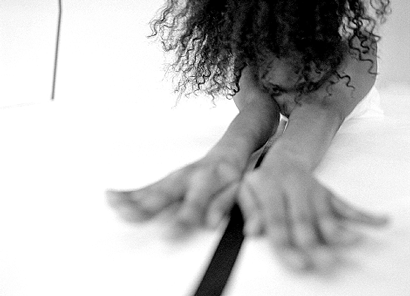Judith Sánchez Ruíz presents her own choreographic message in her adopted home
B
y Lori Ortiz
Judith Sánchez Ruíz toured with the cutting edge Barcelona-based dance theater troupe Mal Pelo and danced with the avant-garde modern Danza Abierta in her native Cuba.
But she has something of her own to say and chose New York as the place to develop her choreographic skills to make that possible.
On February 24 through 27, Danspace presents opportunities to discover Ruíz’s universal movement language in “Citizens or Individuals?”
Sánchez impressed audiences as Movement Research artist-in-residence, improvising with David Zambrano at the American Dance Festival, and performing with jazz saxophonist Steve Coleman.
Her choreography in “On Walcott,” based on poetry by Caribbean-born Nobel Prize Laureate Derek Walcott, was performed with musical director Henry Threadgill at Aaron Davis Hall in 2001.
For the upcoming “Citizens or Individuals?” Sánchez collaborates with drummer and husband Dafnis Prieto. He performs his mix of classical, jazz, and alternative music with Jason Lindner on piano and Dana Leong on cello. Set compositions of music and dance are injected with improvisation.
In the hands of these musicians, the expected sounds of each instrument are deconstructed. The music weaves a lively web in interaction with the dance, both originating from the same emotional impetus. Prieto has traveled and created with Sánchez for eight years.
A wobbly, rustic looking cube structure serves as a ‘frame of mind’ in the first part of the piece that Sánchez calls “Puzzle,” or in Spanish, “Rompecabeza.”
Jonathan Cramer’s minimal set piece becomes unstable and fluid when the dancers make contact with it. The space around it buzzes. Sánchez, Michelle Boulé, Daniele Goldman and Elmira Goro take their turn interacting with the pliant framework in solos and duets of varying intensities. In Sánchez’ solo, island rhythms in her muscle memory battle the beat of her adopted New York.
For all the problems in Castro’s Cuba, dance has benefited from government subsidy and perhaps a national sense of pride and priority. Sánchez’s movement conversation with the set piece transparently reveals a struggle to adapt to a new set of rules. Her strong performance presence developed from early training and support in her original country.
Dancers moving in and out of the cube together and in unison revel in emotions: remembering, forgetting. Together they struggle to march to the same drummer, as if learning to walk for the first time in a new land. An airy quartet bounces into a sashay—left, right, forward and back. As American as apple pie.
As citizen or individual, earthy warmth radiates through Sánchez’s charged movement. Her dancers lend their own styles and personae. Her gift to the audience is a danced dialogue about community and our complicity and responsibility in creating it.
WWW Downtown Express
































